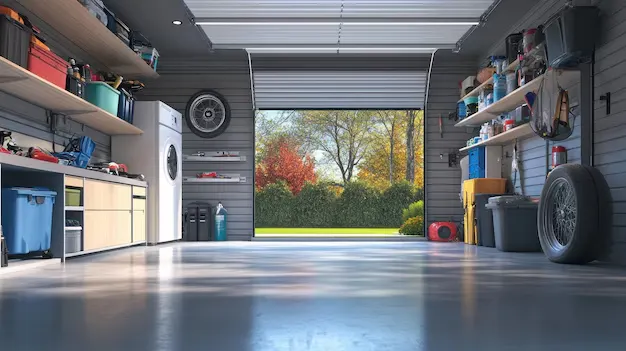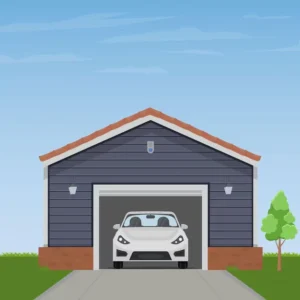Introduction
Your garage floor does a lot more than just protecting your car. It catches oil drips, bears the weight of tools and equipment, absorbs moisture and fog in the winter, and collects dirt, and debris year-round. Over time, this area becomes stained, grimy, and even hazardous if left unmaintained. Because it is not the “guest arrival” place of your home, that’s why it is left untouched during your house cleaning.
Unfortunately, many people tend to ignore garage floor maintenance until the damage is hard to reverse. Oil stains, grease buildup, tire marks, and rust spots not only make your space look unkempt, but they can also weaken concrete surfaces and pose slip-and-fall risks.
But you don’t need to be a professional or buy expensive cleaners to restore the look of your garage floor. With a few simple tools and household ingredients like baking soda and vinegar, you can remove tough stains and restore shine, all on your own with these DIY hacks.
In this detailed DIY garage floor cleaning guide, we’ll discuss:
- How to remove oil stains from a garage floor
- The best homemade garage floor cleaners
- How to degrease concrete without damaging it
- Natural ways to clean rust, road salt, and tire marks
- Step-by-step maintenance tips to keep your floor clean longer
Whether you’re prepping for a garage makeover or just tired of tracking grease into your home, this guide will help you clean smarter, not harder.
Here’s everything you need to know about garage floor cleaning and stain removal.
Why Cleaning Your Garage Floor Matters: Beyond Just Looks

For many homeowners, the garage is more than just a parking spot, it’s an entryway to the luxurious car. But while sweeping living rooms and cleaning kitchens regularly, the garage floor often gets left behind. That concrete slab underfoot silently collects oil, road grime, salt, and debris, all of which can wear it down, dull its appearance, and even impact your safety.
Here’s why garage floor cleaning is not just an aesthetic chore but a smart investment in your property:
Prevents Long-Term Surface Damage
Oil drips from the car, leaked brake fluid, snow salt, and other chemicals don’t just stain the surface, they eat into concrete. Over time, these substances can break down the integrity of your garage floor, leading to cracks, flaking, and costly repairs. Regular cleaning acts as a protective layer, extending the life of your concrete.
Reduces Slip-and-Fall Hazards
An unclean garage floor can become a hidden danger zone. Oil slicks, moldy damp spots, and muddy puddles create slip hazards, especially during rainy or snowy seasons. Cleaning helps eliminate these risks, making your garage a safer space.
Keeps the Rest of Your Home Cleaner
Shoes and car tires often carry dirt, chemicals, and grease into your home. A clean garage floor acts as a filter, reducing how much grime makes its way into your living space.
Maintains Hygiene in Multipurpose Garages
A clean floor is crucial if you’re spending time in the garage for anything other than parking. It contributes to better air quality, less dust, and a more comfortable environment overall.
Prepping for a Garage Floor Deep Clean
Getting your garage floor spotless isn’t just about scrubbing, preparation makes all the difference. A well-prepped surface ensures better cleaning results, helps tackle tough stains efficiently, and saves you time and effort down the line.
Here’s how to set the stage for a successful deep clean:
Clear the Junk
Garage junk cleaning is the first step towards your garage cleaning. Start by removing everything off the floor including your car, tools, storage bins, gym equipment, and seasonal items. You should have a clear, open workspace that allows you to reach every inch of the floor without obstacles.
Pro Tip: Use this opportunity to reorganize and declutter items you rarely use. A clean floor paired with a tidy garage = total transformation.
Sweep Thoroughly
Once the floor is cleared, grab a stiff-bristled push broom and begin sweeping. Remove loose dirt, dust, pebbles, and spider webs. Make sure to sweep into corners, along walls, and behind where shelving units usually sit — hidden grime tends to accumulate in these zones.
Pro-Tip: Dry sweep step is crucial to avoid turning loose dirt into muddy streaks when you start washing.
Dry Scrub Stains First
Before introducing any water or soap, address those stubborn oil or grease stains. Sprinkle baking soda, sawdust, or kitty litter directly over each stain. Let it sit for 30 minutes or longer to absorb surface-level oil.
Then, using a stiff brush or broom, scrub the area in circular motions to help break down the residue. This pre-treatment makes your upcoming wash much more effective and reduces chances of permanent discoloration.
How to Remove Oil Stains from a Garage Floor
Oil stains are not just an eyesore — they can damage your concrete over time and become tougher to clean the longer they sit. Whether it’s from a leaky car or spilled motor oil, these DIY methods will help restore your garage floor without harsh chemicals.
Method 1 — Baking Soda + Dish Soap (Gentle Yet Effective)
This eco-friendly combo works great for fresh oil spills or light stains. Baking soda absorbs oil, while dish soap cuts through grease.
Steps:
- Sprinkle baking soda generously over the oil-stained area.
- Add a few drops of dish soap on top — ideally a degreasing formula.
- Scrub using a stiff-bristled brush and warm water in circular motions.
- Rinse thoroughly with clean water and let it dry.
- Repeat the process if any stain remains.
Bonus Tip: Let the baking soda sit for 15–20 minutes before scrubbing to absorb more oil.
Method 2 — White Vinegar for Tougher Stains
For older or set-in stains, white vinegar is a powerful natural acid that can penetrate porous concrete and loosen deep grease.
Steps:
- Pour white vinegar directly on the stain — no dilution needed.
- Let it sit for 15–20 minutes to break down the oil particles.
- Scrub the area firmly with a brush.
- Rinse with water and let the spot dry completely.
Pro Tip: After rinsing, sprinkle a bit of baking soda over the damp spot. It’ll neutralize any odor and provide a final polish once dry.
These methods are perfect for those who want a natural, cost-effective approach to garage floor cleaning — no need for harsh degreasers or pressure washers unless stains are extremely stubborn. Learn in detail about how to use Vinegar for cleaning floors.
How to Degrease the Entire Garage Floor
Grime and buildup affect the entire surface — not just where cars park.
Natural DIY Degreaser Mix
Create your own effective cleaner using household items:
- 1 cup baking soda
- 1/2 cup white vinegar
- 2 tablespoons dish soap
- 1 gallon warm water
Instructions:
- Mix in a large bucket.
- Pour small sections at a time and scrub with a stiff bristle broom.
- Let sit for 5–10 minutes.
- Rinse thoroughly with clean water or a mop.
For heavy-duty grime, you may need to repeat the process or increase the vinegar and soap ratio.
Removing Rust, Paint & Salt Stains
Rust and salt can be tricky, especially in garages that experience snow, rain, or leaks.
Rust Removal (Lemon Juice or Vinegar)
Steps:
- Apply lemon juice or white vinegar directly to the rust stain.
- Let sit for 10–15 minutes.
- Scrub gently with a wire brush.
- Rinse with water.
Paint Stains
Use a plastic scraper or putty knife to lift dried paint. Avoid metal scrapers, which may gouge concrete.
Optional: Dab with rubbing alcohol or acetone for stubborn splatters, then scrub and rinse.
Salt Stains (Winter Garage Care)
Salt can leave white marks and eat away at concrete. Use this quick remedy:
- Mix equal parts vinegar and warm water.
- Scrub the stained area with a stiff brush.
- Rinse and repeat as needed.
How Often Should You Clean Your Garage Floor?

Just like the rest of your home, your garage floor needs regular attention to stay clean, safe, and long-lasting. But how often is “regular”?
Quick Clean (Every 2–3 Weeks):
Do a light sweep with a stiff broom to remove dust, and surface dirt. This helps prevent buildup from becoming stubborn grime over time.
Deep Clean (Every 3–4 Months):
Plan a full cleaning routine each season. This includes stain removal, scrubbing, and possibly resealing if needed — especially if your garage doubles as a workspace or storage area.
Seasonal Adjustments:
- Winter: Increase your cleaning frequency due to road salt, snow, and slush tracked in by vehicles. These can corrode your floor surface.
- Rainy Seasons: Watch out for muddy footprints and water stains, especially near the entrance.
Keeping a consistent cleaning schedule ensures your garage stays not only tidy, but also protected against long-term wear and tear.
Pro Tips to Maintain a Cleaner Garage Floor
Keeping your garage floor clean doesn’t stop at one deep clean — the right habits and tools can make all the difference long-term. Here’s how to preserve that spotless look and prevent future buildup:
Use Mats or Drip Trays
Place oil-absorbing mats or drip trays under vehicles, motorcycles, or workbenches. They catch fluids before they hit the floor, helping reduce oil stains, coolant puddles, or paint splatters.
Install a Floor Sealant
Concrete is porous, which means it soaks up everything — unless it’s sealed.
- A garage floor sealant acts as a protective layer, making it resistant to oil, chemicals, and water damage.
- Bonus: It also makes future cleaning quicker and more effective.
Clean Spills Immediately
Whether it’s oil, paint, or even soda — time is not your friend.
- Blot or absorb spills right away with kitty litter, paper towels, or baking soda.
- Quick action prevents permanent stains and reduces the chance of slipping.
Pro Tip: Keep a basic spill-cleaning kit in the garage for emergencies — absorbent powder, a brush, gloves, and a bucket of warm soapy water.
When to Consider Professional Cleaning Services
If you’re dealing with:
- Widespread oil saturation
- Mold and mildew growth
- Paint removal after renovation
- Repeated stains despite cleaning
It may be time to call in professional garage cleaners.
Conclusion
Your garage deserves more than to be a forgotten space. A clean, well-maintained garage floor can completely refresh your home’s look and function. By using simple tools like baking soda, vinegar, and a stiff brush, you can easily tackle oil stains, rust, grime, and winter salts without spending a fortune.
So roll up your sleeves, clear the space, and follow the steps in this guide. In just a few hours, your garage floor can go from grimy to gleaming and stay that way with regular care.
While this guide helps you with DIY, the benefits of hiring cleaning professionals include time-saving, expert results, and peace of mind. However, it would cost you some money, but you can find here how much it costs to get your home cleaned and can get an idea if it fits your budget or not.
Whether you’re living in Toronto, Vancouver, or elsewhere in Canada, the cost of hiring cleaning services can vary based on your location, home size, and the type of service you need.
Contact us for all your home cleaning needs.
FAQs: Garage Floor Cleaning
What is the best homemade garage floor cleaner?
The best homemade garage cleaner is a mix of baking soda, vinegar, dish soap, and warm water is an effective DIY degreaser that’s safe and budget-friendly.
How do I remove old oil stains from concrete?
You can remove using baking soda and dish soap for mild stains. For deeper stains, try applying white vinegar, let sit for 20 minutes, then scrub with a stiff brush.
Can I use a pressure washer on my garage floor?
Yes, but use it carefully. Pressure washers are great for rinsing after you’ve applied cleaner. Avoid high pressure near floor edges or cracks.
How do I clean rust off my garage floor?
You can do it by applying lemon juice or vinegar to the rust stain, let sit for 10–15 minutes, and scrub with a wire brush. Rinse and repeat if needed.
How can I prevent future oil stains?
For your future oil stains prevention, you can use oil-absorbing mats or cardboard under vehicles, and clean up spills immediately to prevent them from soaking in.
